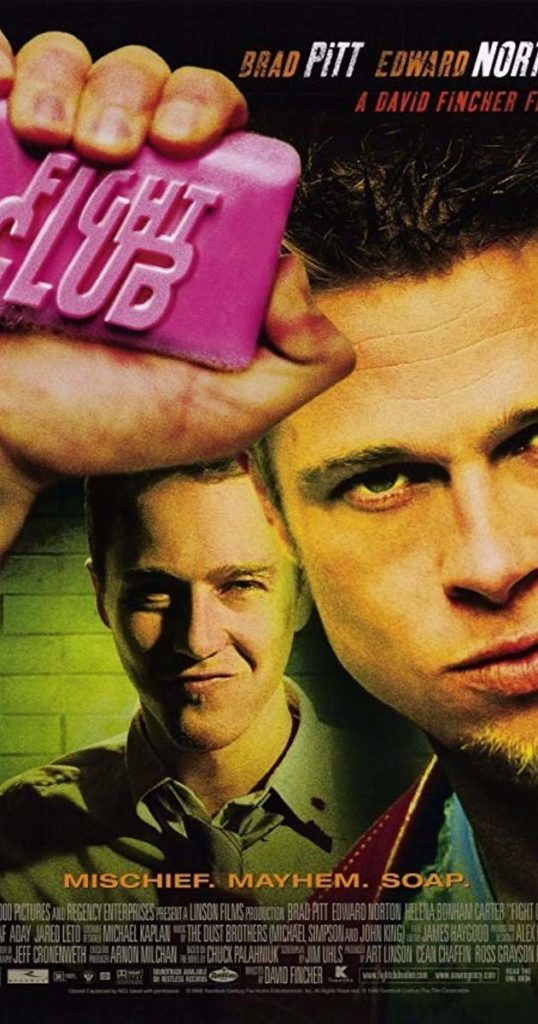The first time I saw Fight Club, when it came out in 1999, I said, “I am going to teach the fuck out of this.”
And I have.
It’s a beautifully constructed film (dir. David Fincher), based on a powerful novel by Chuck Palahniuk.
It also strikes a chord with those of us who want to understand and who fear toxic masculinity.
(Sadly, it also appeals to those who are toxic. I have had a few young male students misunderstand the film, seeing it as an endorsement of Tyler Durden’s worldview, instead of as a critique of it.)
I most recently taught it in an advanced composition class as part of a zeitgeist assignment.
Fight Club set now would be a very different movie.
A 2019 Fight Club would still critique consumer culture and its role in what’s bothering our straight middle class white men–Susan Faludi explained in 1999 that contemporary Western men feel adrift–they are no longer respected simply for being men; they struggle to financially support themselves and their families. Faludi noted that they were actually in a position close to women in the 1950s–encouraged to find satisfaction by looking good (hitting the gym and using product) and buying the right things. Faludi called this the culture of ornament.
The protagonist in the film isn’t satisfied in ornamental culture. Divorced from real connections with people, he attempts to find happiness in self-help groups and then in a hyper-masculine paramilitary terrorist organization.
Notably, he doesn’t ever try helping another person or finding an honest connection with others.
Our protagonist would still have the same choices before him if he were having his crisis in 2019. More might be made of escaping with drugs, though. In the film, he asks for sleeping pills–his doctor refuses because the narrator needs real sleep. It’s likely he would have gotten his hands on pills some other way–and perhaps pain killers–if the movie were set now. (One can also imagine an epidemic of opiate use in the Fight Club members–there are so many emergency room visits–so many broken bones.)
A 2019 movie would likely show the men to be even more misogynistic than they were in 1999. Tyler explains that they were raised by women and abandoned by their fathers–he questions whether they need women. But it’s likely those same men now would also be incels–the whiny, insecure men who think they are owed sex, that women shouldn’t get to turn them down. Tyler famously said: “We’ve all been raised on television to believe that one day we’d all be millionaires, and movie gods, and rock stars. But we won’t. And we’re slowly learning that fact. And we’re very, very pissed off.” Inherent in the promise of being a millionaire movie/rock star is the promise of women chasing you. Not having easy access to sex is part of why weak men are very, very pissed off now.
And incels are a growing problem in domestic terrorism.
Speaking of domestic terrorists, Fight Club‘s world is overwhelmingly white. Would today’s Tyler be resorting to racism and a fear of immigrants to make his army? Probably.
Watching Fight Club in the #metoo era is interesting. Project mayhem isn’t just attacking corporations and chain coffee places–one of the headlines we see is “Performance Artist Molested.” One shudders to imagine what they did.
But the biggest change when watching this movie now is the intense discomfort when the protagonist threatens to commit a mass-shooting at work. We hadn’t had as many of those incidences in 1999–not enough for the manager to fire him and call the cops, which is what I’m assuming would happen now.
The protagonist makes a clear threat after his boss asks him about the Fight Club flier in the copy machine:
“Well, I gotta tell you: I’d be very, very careful who you talk to about that, because the person who wrote that… is dangerous. And this button-down, Oxford-cloth psycho might just snap, and then stalk from office to office with an Armalite AR-10 carbine gas-powered semi-automatic weapon, pumping round after round into colleagues and co-workers. This might be someone you’ve known for years. Someone very, very close to you.”
He then notes these words are Tyler’s.
How does anyone watch this now and think Tyler’s ideas are good ones?

Update: McSweeney’s also played around with how we should understand Fight Club 20 years later here. It’s awesome.
Second update: When I taught this in Winter 2020, one of my students said it looked like a pretty Republican world, because he saw so many American flags. I then had to explain that back in the 1990s, flying or wearing a flag had nothing to do with political party. It’s only after the 2000 election and 9/11 that Republicans somehow co-opted it. (Notably, that’s the election that invented the idea of “red” and “blue” states.)




